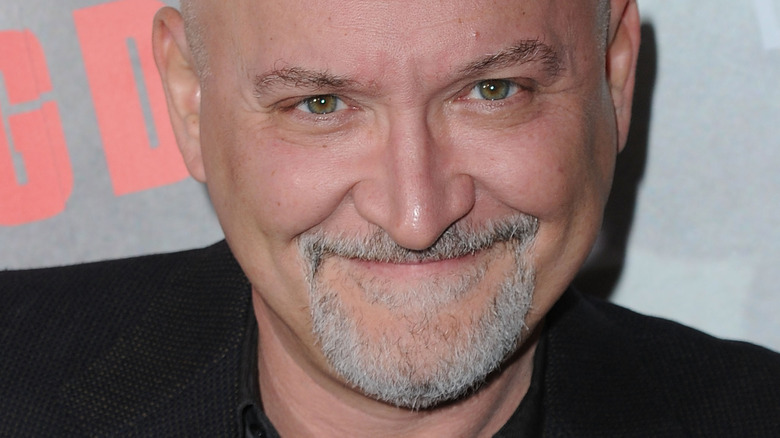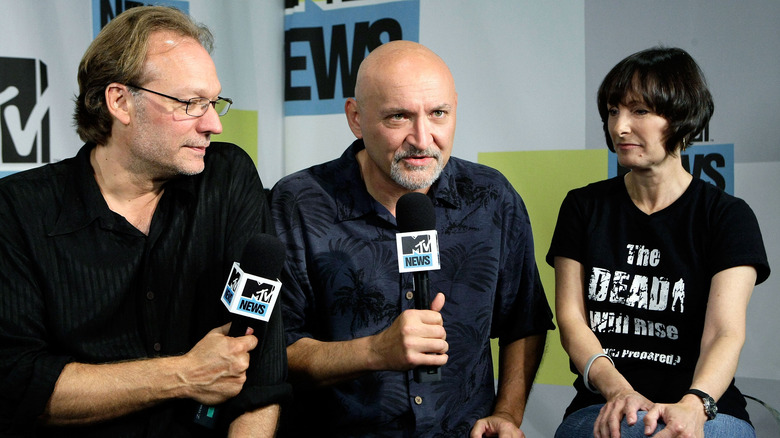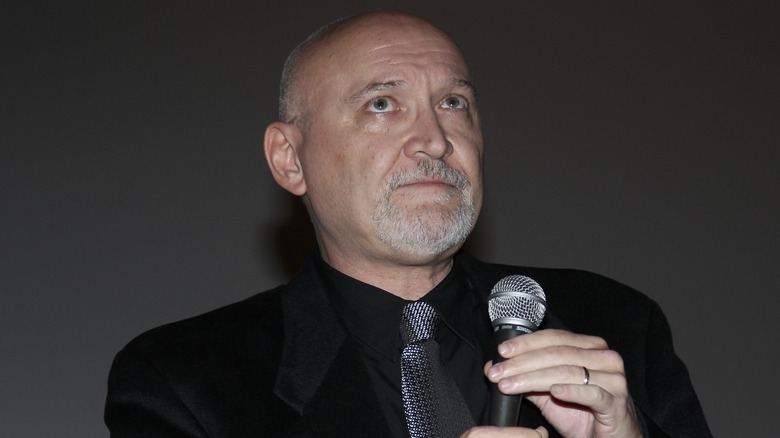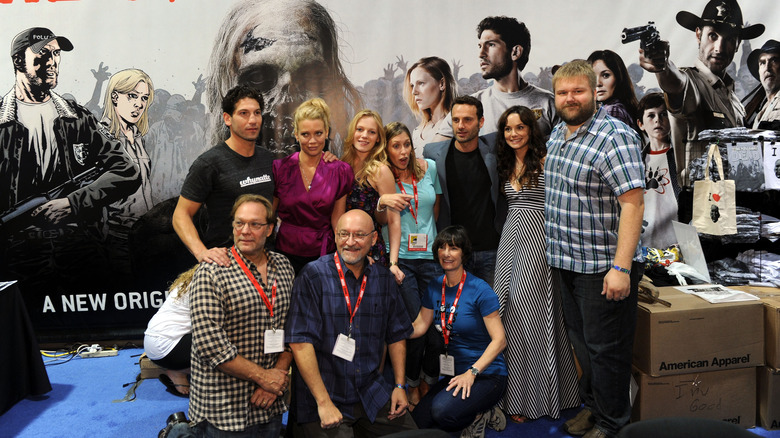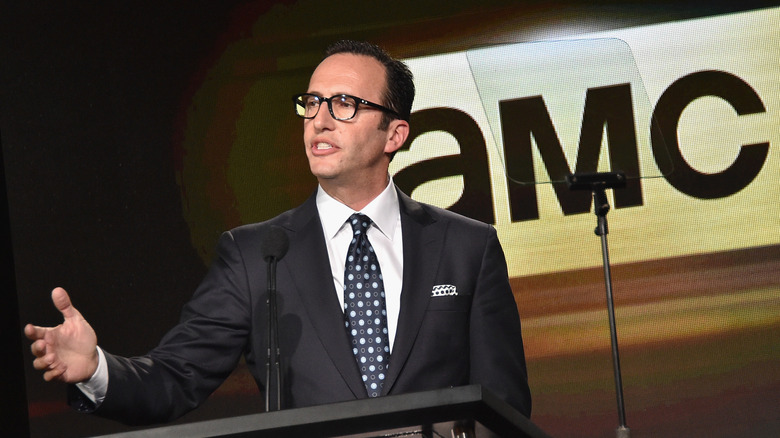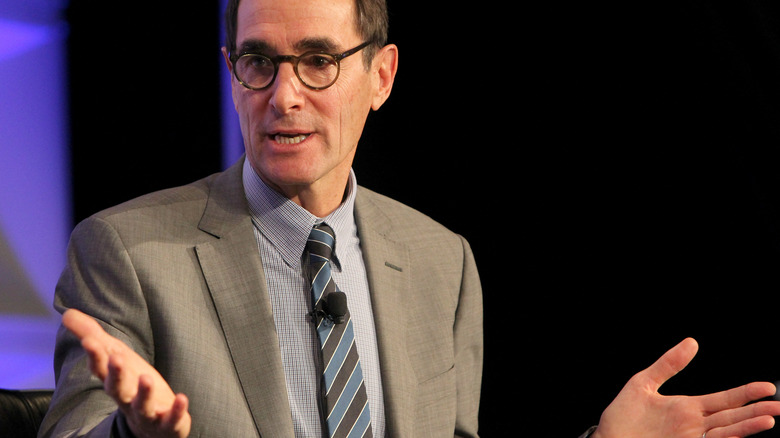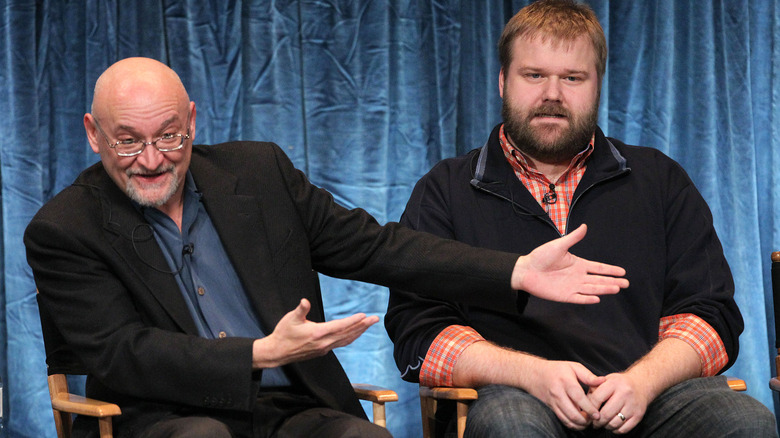The Sordid Drama Behind Frank Darabont's Firing From The Walking Dead
An era has ended. In November 2022, the final episode of "The Walking Dead" aired on AMC. Though the series had seen several years of diminishing returns in recent years (per Variety), "The Walking Dead" nonetheless left behind a major legacy on the television landscape, and it changed forever our demands on the undead genre. Not only did it launch a litany of "TWD" spin-offs after successfully tapping in to an already fast-spreading zombie renaissance, it helped take AMC from a 2.4 billion dollar company in 2011 to — at the network's 2015 peak, just months after the series' historical Season 5 premiere — a company worth well over 6 billion (per Macrotrends). Thus, despite the series overstaying its welcome, it was an integral, even titular element of what critic and author David Bianculli dubbed "the platinum age of television" (via NPR).
But the original mind behind the revolutionary series, Frank Darabont, wasn't there for the vast majority of its lifespan. In July 2011, prior to the completion of Season 2, AMC fired Darabont in a controversial move that fans of the series have been debating ever since. While the question of what the series might have been with the "The Shawshank Redemption" director at the helm can't really be answered, the question of how and why he was let go, and the details of the decision's fallout, are a matter of public record — or, more accurately, records — that tell two very different stories.
AMC claimed Darabont was abusive, unprofessional
As Variety reported in 2017, AMC claimed that "[Darabont's] erratic and unprofessional performance" — evidenced in part by an email written by the director that contained a number of expletives, and was littered with hyperbolic and threatening language — was the sole reason for the network's decision. In it, Darabont writes, "Everybody especially our directors better wake the f*** up and pay attention or I will start killing people and throwing bodies out the door." In another, Darabont says (of two writers on the series), that he should have, in his words, "hunted them down and f***ing killed them with a brick."
Joel Stillerman, former chief of programming for the network, cited a number of other offenses regarding Darabont's inability to manage script deadlines, the writers, and the budget, saying in his deposition that the showrunner was, he said, "quite bad at his job [and] jeopardizing the enterprise itself."
Importantly, all this came to light not when Darabont was first let go, but in a series of filings accompanying AMC's 2017 attempt to have Darabont's 2013 suit against the network dismissed. The original showrunner and the network went head-to-head for years following the former's firing, in a battle that would further complicate an already complex breakup.
...after Darabont sued AMC in 2013
In the 2013 suit, Darabont claimed AMC owed him a hefty chunk of change for his work on Seasons 1 and 2 on "The Walking Dead," as his lawyer told The Hollywood Reporter in December of that year. By licensing the show to itself — a practice known as "self-dealing" — Darabont and his agents at CAA alleged that AMC was depriving both of the profits Darabont's initial contract guaranteed.
Here's how "self-dealing" works, in layman's terms: the more a show makes and the higher its licensing fee — a fee ordinarily determined by the show's market value, and agreed upon between producer and distributer — the more its profit-sharing talent should make. But if the producer is also the distributor (a feat achieved through the so-called "vertical integration" of a network and its subsidiaries) it can manipulate that market value and licensing fee to make it appear as though the show is worth less than it is, and subsequently owes its talent less than it does (via Cardozo Arts & Entertainment Law Journal, Vol. 19, Issue 3).
This, in essence, is what "The Green Mile" director was accusing AMC of doing. The suit claimed the network (the producer and distributor of "The Walking Dead") insisted the popular show was at a deficit of $49 million as of September of 2012 — a claim that allowed them to keep Darabont from receiving, as his lawyer phrased it to the outlet, "that first dollar," of his agreed-upon profit participation. Relevantly, Darabont's suit was not the first of its kind ...
Darabont's suit had precedent
"X-Files" star David Duchovny filed similar litigation in 1999, while the series' creator and executive producer Chris Carter followed (and filed) suit in 2006 (via New York Times). "Home Improvement," "Will & Grace," and "Smallville" have also found themselves wrapped up in similar suits, and although "vertical integration" sounds like a term Alec Baldwin's synergy-happy Jack Donaghy would make up, it's been a hot button issue in Hollywood since the late 1990s (via Newsweek). But if the licensing fee and profit revenue element of Darabont's suit was nothing new, the showrunner's 2015 amendment to the lawsuit was.
In August, Darabont added an allegation of wrongful termination to the suit, claiming AMC fired him halfway through Season 2 solely so they could pay him even less profit share. As The Hollywood Reporter revealed the following February, that is more or less exactly what happened. After firing the showrunner, AMC reduced his profit percent from 10 to 7.5, counting him as just 3/4 vested since he was no longer working full-time on the series by the end of Season 2. Darabont's lawyers insisted, however, that the contract never stipulated he had to be on full-time for the duration of a series' cycle to be considered fully vested. Justice Eileen Bransten — who was already unhappy with AMC for dragging the discovery period of the case out for, at that point, over three years — subsequently dismissed AMC's motion to dismiss.
AMC felt Darabont's discovery requests were irrelevant
Following the justice's decision, AMC told the outlet that (essentially) the rejection of their motion was expected given the court's obligation at the juncture (the spokesperson did not acknowledge or respond at that time to Justice Bransten's frustration with AMC's approach, which she called "annoying" and "manipulative," per The Hollywood Reporter).
From the outset, AMC insisted that — in essence, and in layman's terms — they hadn't breeched Darabont's contract, and had every right to decide the aforementioned licensing fee "so long as it was no less than what AMC Studios credited to other Series contingent participants" (via THR). As part of the initial discovery, Darabont's team subsequently sought information regarding the "other Series" to which the network pointed ("Mad Men" among them), such as licensing fees and Nielsen ratings. AMC objected to the showrunner's request, calling the information "irrelevant."
Darabont's team felt differently. In their view, AMC was relying on what they called "bizarre contract interpretations during what should be a routine discovery dispute" (via THR). In their response to AMC's objection, the plaintiffs called out the network's atypical decision to articulate their relevancy objection via a Letter to the Court — an act they saw as telling.
"If Defendants truly believed their current position had any merit," their letter reads, "a motion to dismiss [rather than a letter] would and should have been filed."
...but not everyone felt Darabont's emails were relevant, either
The lengthy discovery debates are of no small consequence, since they expose, at least in part, to the gap between the network's approach early on and the more personal approach they would later (attempt to) use before dropping it altogether. Initially, AMC was relying on their interpretation of Darabont's contract and the amount of money they'd already paid to the showrunner ($3 million, per THR) to fight Darabont's suit.
By all appearances, it wasn't until their attempt to drag out discovery began to fail them that they put Darabont's (admittedly volatile) emails on the table. Of those emails, "Sons of Anarchy" creator Kurt Sutter (though he acknowledged the indefensibility of the showrunner's language), said AMC was "TMZ-ing" Darabont by digging up and releasing excerpts devoid of context (via Comic Book).
Notably, the same justice who found AMC's behavior during the discovery period "manipulative" in February of 2016 (Justice Bransten) appeared similarly unimpressed by the network's personal attack approach in September of 2017, as The Hollywood Reporter revealed: "That is an artiste you are dealing with," she said. Her dismissal foreshadowed a later ruling on the probative value of said emails, but it was one that would take several more years to come.
The lawsuit can only tell us part of the story
Much like "The Walking Dead," Darabont's fight with AMC would drag on and on. According to THR, it went on to involve a "spin-off" lawsuit filed in 2018, and reach a wholly unsatisfying finale chapter, at least from a narrative perspective (if not a financial one).
In the end, both the emails and Darabont's "fair market value approach" got the axe by New York Supreme Court Justice Joel Cohen, as Deadline reported in 2021. AMC would only be able to put the showrunner's behavior in play if the showrunner opened the door by maintaining his wrongful termination allegation (which he dropped in 2015, per THR). Thus, whether or not AMC fired Darabont due to ineptitude and nasty emails, or an unwillingness to meet the showrunner's pricey contract once the series took off, will remain a source of debate.
But here's what we do know:
Ultimately, AMC settled with Darabont, agreeing to pay their former writer-director and showrunner $200 million — $57 million of which was pure profit participation stipulated in his original contract — and ceding that Darabont and CAA will continue to receive profit share for any future streaming deals attached to "The Walking Dead" and "Fear the Walking Dead" (via Variety). We also know that, well before his 2011 firing and by his own admission, Darabont (who was not the only creative to sue AMC over "The Walking Dead") had tension with the execs at AMC.
Darabont and AMC represent an age-old war
To paraphrase the complaints made in a deposition and revealed in 2016, the showrunner felt the powers that be were being greedy and cheap to a degree that hurt the cast, crew, and creative integrity of the series. Darabont felt the execs, in response to his pushing back, concocted a reason to fire him by falsely claiming he was skipping tone meetings with the directors (via THR).
Perhaps most revealingly of all, we know that the cast supported their former creative captain. In 2022, Sarah Wayne Callies (Lori Grimes) called Darabont's firing an "assassination," saying that, in her words, "the reasons that we were given were that he's unexperienced as a showrunner and he's unprepared .. .But this motherf—er, one month before we started shooting Season 2, dropped six completed scripts in my lap [and] they were wonderful" (via The Wrap). Speaking to Entertainment Weekly, Melissa McBride (Carol Peletier) had words of high praise for Darabont, while Andrew Lincoln (Rick Grimes) looked back on the writer-director's firing with deep sorrow.
The lengthy lawsuit, with all its twists, turns, and tantrums, began as a plaintiff suing a defendant for money owed (and for engaging in shady practices in order to justify its withholding), evolved into a mudslinging fest, was eventually reigned back in to focus on the numbers, and finally came to rest in a settlement nearly a decade in the making. But at the heart of all this chaos lies a story every bit as old as the horror genre itself: the age-old battle between money and art.
